NYSACTE, Advance CTE, and ECMC Foundation are excited to introduce the Fellows of the inaugural cohort of emerging leaders from across New York State. The Fellows of the NYSACTE Postsecondary State Career Technical Education (CTE) Leaders Fellowship at Advance CTE—Sponsored by ECMC Foundation include representation across multiple demographic categories reflecting the Fellowship’s goal of intentionally building a postsecondary leadership pipeline for underserved populations in CTE that closes racial representation gaps and removes equity barriers to postsecondary leadership advancement. This blog series will briefly introduce each NYSACTE Fellow.
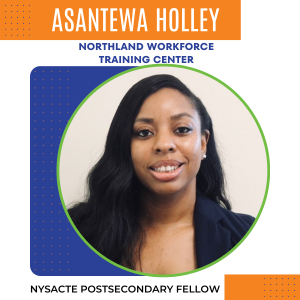 Asantewa K. Holley is the vice president of operations for Northland Workforce Training Center (NWTC). Ms. Holley has worked in the financial industry for eighteen years holding multiple operational management roles. Ms. Holley holds an MBA from The University of Buffalo, B.S. in accounting from Empire State College, and is a 2020 Graduate of Leadership Buffalo, 2023 Graduate of the New York Association of Training and Employment (NYATEP) Workforce Academy, and Fellow of the Oishei Foundation’s Karen Lee Spaulding Leaders of Color.
Asantewa K. Holley is the vice president of operations for Northland Workforce Training Center (NWTC). Ms. Holley has worked in the financial industry for eighteen years holding multiple operational management roles. Ms. Holley holds an MBA from The University of Buffalo, B.S. in accounting from Empire State College, and is a 2020 Graduate of Leadership Buffalo, 2023 Graduate of the New York Association of Training and Employment (NYATEP) Workforce Academy, and Fellow of the Oishei Foundation’s Karen Lee Spaulding Leaders of Color.
Ms. Holley currently serves as a board member for Housing Opportunities Made Equal (HOME), the Michigan Street Preservation Corporation – Nash House, Goodwill WNY, Leadership Buffalo, Community Advisory Board for Buffalo Toronto Public Media, and Trustee at True Bethel Baptist Church. Ms. Holley is a member of the National Black MBA Association, WNY Chapter. She has won several awards including Business First 40 Under 40, Purposeful Women of Faith Business and Finance awardee, and the Buffalo Black Achiever Award. Ms. Holley was recently appointed as a commissioner to the City of Buffalo Commission of Citizen’s Rights & Community Relations.
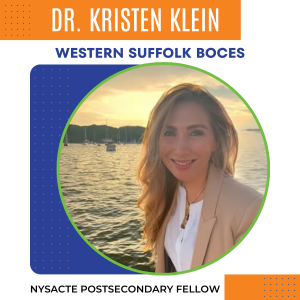 Dr. Kristen Klein serves as the supervisor for adult & secondary programs within the Career and Technical Education Division at Western Suffolk BOCES. In this role, she oversees the postsecondary School of Allied Health Sciences, the Office of Financial Aid, and institutional accreditation processes. Dr. Klein is also an Adjunct Assistant Professor at Hofstra University where she teaches research methodology in the Department of Counseling & Mental Health Professions.
Dr. Kristen Klein serves as the supervisor for adult & secondary programs within the Career and Technical Education Division at Western Suffolk BOCES. In this role, she oversees the postsecondary School of Allied Health Sciences, the Office of Financial Aid, and institutional accreditation processes. Dr. Klein is also an Adjunct Assistant Professor at Hofstra University where she teaches research methodology in the Department of Counseling & Mental Health Professions.
With a Doctor of Education in Educational Leadership and Policy Studies, specializing in Higher Education, Dr. Klein is deeply committed to advancing student success. Her research explores the factors that enhance academic outcomes for chronically ill and disabled postsecondary students, reflecting a dedication to inclusivity and equity in education.
Outside of work, Dr. Klein is a passionate distance runner and powerlifter. Her approach to life mirrors her athletic pursuits, combining endurance and strength to overcome challenges and achieve goals. She finds joy and balance in her family life and in caring for her beloved sphynx cat, Rocky.
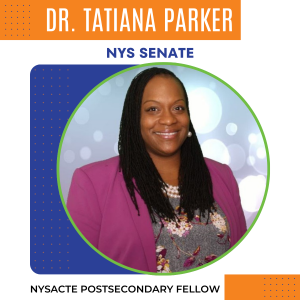 As the Director of Constituent Services and Grant Administrator for a New York State Senator in Central New York, Dr. Tatiana C. Parker helps constituents navigate challenges with state and local agencies, understand state government functions, and provides state capital grant direct technical assistance to local municipalities and non-profit organizations.
As the Director of Constituent Services and Grant Administrator for a New York State Senator in Central New York, Dr. Tatiana C. Parker helps constituents navigate challenges with state and local agencies, understand state government functions, and provides state capital grant direct technical assistance to local municipalities and non-profit organizations.
Beyond her professional work, Tatiana is a purpose-driven leader committed to building stronger, more inclusive communities. Through active involvement with local and national non-profit organizations such as Delta Sigma Theta Sorority, Inc., the National Council of Negro Women, Inc., and Lambda Kappa Mu, Inc., she equips individuals with the knowledge, resources, and networks needed to achieve upward mobility.
A recognized leader, Tatiana was named one of Syracuse’s 40 Under 40 (2018) and received the SUNY Chancellor’s Award for Student Excellence (2019), the highest student honor within the State University of New York system. She is also an alumna of Leadership Greater Syracuse, LeadUP CNY, and Nourishing Tomorrow’s Leaders community-based programs.
Tatiana holds an A.S. in Human Services from Onondaga Community College, a B.A. in Political Science from SUNY Oswego, an M.A. in Social and Public Policy, and a Professional Certificate in Community Advocacy from Empire State College, and an Ed.D. in Executive Leadership from St. John Fisher University. Her research focuses on social capital’s role in economic mobility, especially for historically disadvantaged populations.
Tatiana’s work bridges education, workforce development, and community, aligning with NYSACTE’s mission to prepare individuals for meaningful careers and civic engagement.
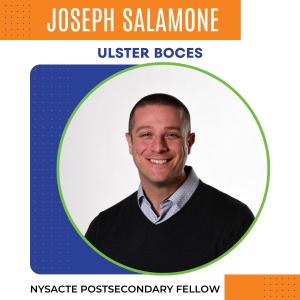 Joe Salamone is a passionate and dedicated educator with a deep commitment to fostering innovative learning experiences that prepare young people for success. Currently serving as the Assistant Director of Career Pathways Programs at Ulster BOCES, Joe is driven by a belief that all students deserve equitable access to high-quality CTE opportunities that connect their learning to real-world careers while helping them grow into good humans who are also future-ready. Recognized as an educational innovator, Joe is skilled in developing and implementing cutting-edge programs that engage students and promote their academic and career growth. He is eager to contribute his expertise and collaborative spirit to initiatives that empower students and strengthen CTE programs across New York State.
Joe Salamone is a passionate and dedicated educator with a deep commitment to fostering innovative learning experiences that prepare young people for success. Currently serving as the Assistant Director of Career Pathways Programs at Ulster BOCES, Joe is driven by a belief that all students deserve equitable access to high-quality CTE opportunities that connect their learning to real-world careers while helping them grow into good humans who are also future-ready. Recognized as an educational innovator, Joe is skilled in developing and implementing cutting-edge programs that engage students and promote their academic and career growth. He is eager to contribute his expertise and collaborative spirit to initiatives that empower students and strengthen CTE programs across New York State.
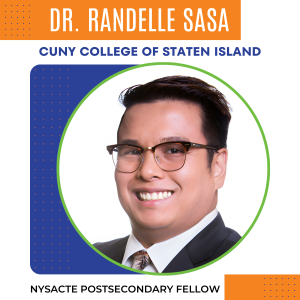 Dr. Randelle Sasa has two decades worth of experience in nursing practice, education, and research. He is currently an associate professor and chair of the Department of Nursing at the College of Staten Staten Island of the City University of New York (CUNY). In this role, Dr. Sasa supervises around 350 students, and 75 faculty members across associate, bachelor’s, master’s, and doctoral programs in nursing. Dr. Sasa’s research interests include Filipino caring, health disparities among Asian American and Pacific Islanders, men in nursing, and high-impact educational practices (HIPs) in nursing. Dr. Sasa teaches Medical-Surgical Nursing, Critical Care, and Nursing Research. Dr. Sasa’s most recent professional recognitions include the 2024 Gene Tranbarger Research Award by the American Association for Men in Nursing (AAMN), and the 2023 Elsevier Educator of the Year Award by the Organization of Associate Degree Nursing (OADN).
Dr. Randelle Sasa has two decades worth of experience in nursing practice, education, and research. He is currently an associate professor and chair of the Department of Nursing at the College of Staten Staten Island of the City University of New York (CUNY). In this role, Dr. Sasa supervises around 350 students, and 75 faculty members across associate, bachelor’s, master’s, and doctoral programs in nursing. Dr. Sasa’s research interests include Filipino caring, health disparities among Asian American and Pacific Islanders, men in nursing, and high-impact educational practices (HIPs) in nursing. Dr. Sasa teaches Medical-Surgical Nursing, Critical Care, and Nursing Research. Dr. Sasa’s most recent professional recognitions include the 2024 Gene Tranbarger Research Award by the American Association for Men in Nursing (AAMN), and the 2023 Elsevier Educator of the Year Award by the Organization of Associate Degree Nursing (OADN).
To learn more about the NYSACTE Fellowship please visit https://www.acteonline.org/nysacte/nysacte-postsecondary-fellowship/.


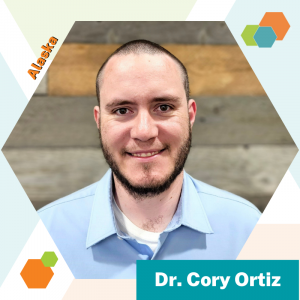 A:
A: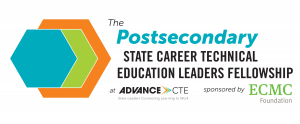


 Kevin Imes’ 36-year career in public education covers a diverse range of experiences. From the beginning of his career as a Biology teacher in downtown Phoenix schools to his role in opening a magnet program, an alternative school, a comprehensive high school and a public CTE district from the ground up, Kevin’s expertise in program development lends itself well to his new position as State CTE Director.
Kevin Imes’ 36-year career in public education covers a diverse range of experiences. From the beginning of his career as a Biology teacher in downtown Phoenix schools to his role in opening a magnet program, an alternative school, a comprehensive high school and a public CTE district from the ground up, Kevin’s expertise in program development lends itself well to his new position as State CTE Director. “As a lifelong learner, I’ve always been intentional in my pursuit of professional development and growth in my career.”
“As a lifelong learner, I’ve always been intentional in my pursuit of professional development and growth in my career.”
 Monique discovered CTE like many do as a path to reskill after an economic shift. After the mortgage industry collapse in 2007, Monique was forced to redirect her career path from a financial-focused background as a Mortgage Residential Underwriter to education. Monique went back to school and earned a Bachelor of Science in Education.
Monique discovered CTE like many do as a path to reskill after an economic shift. After the mortgage industry collapse in 2007, Monique was forced to redirect her career path from a financial-focused background as a Mortgage Residential Underwriter to education. Monique went back to school and earned a Bachelor of Science in Education.